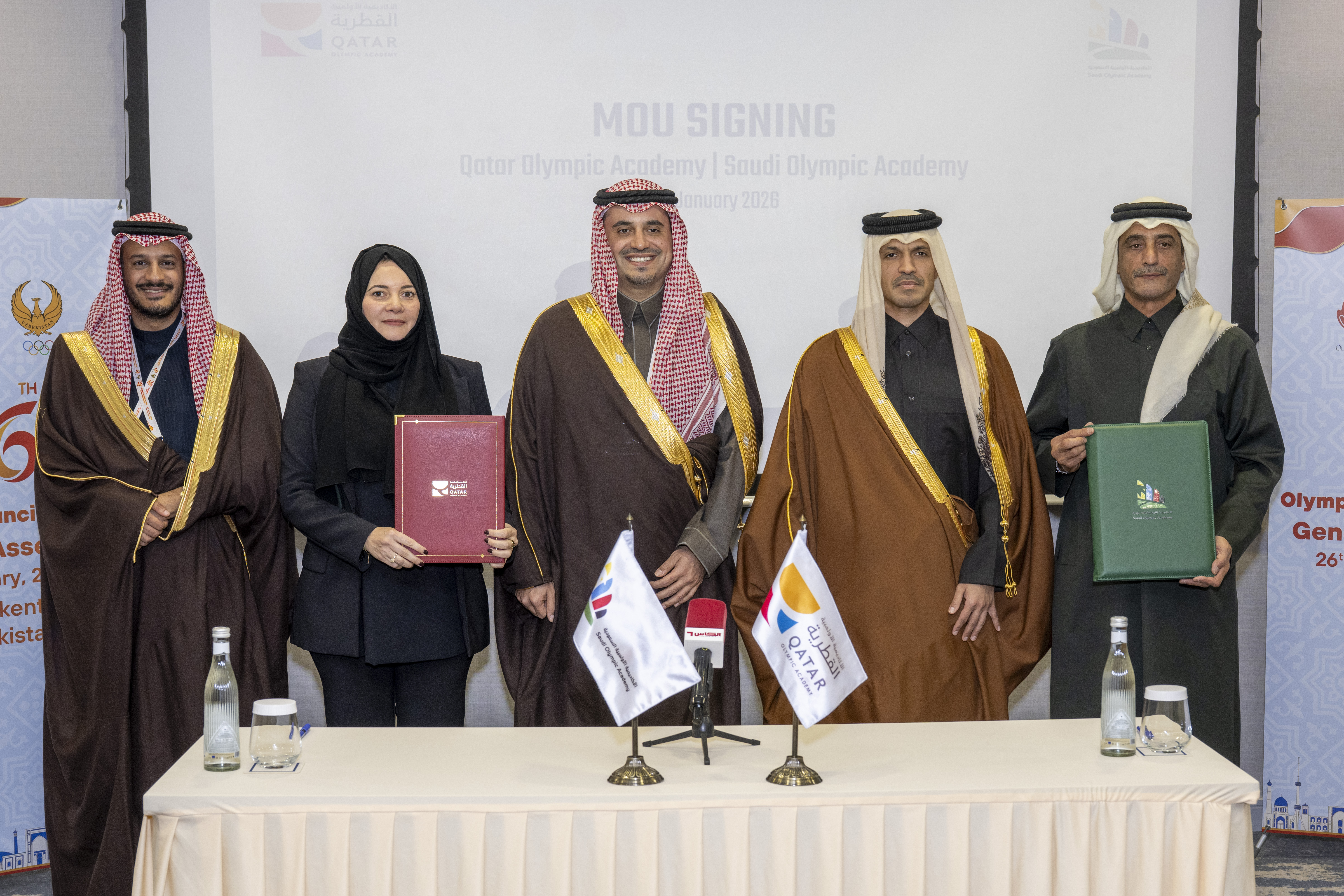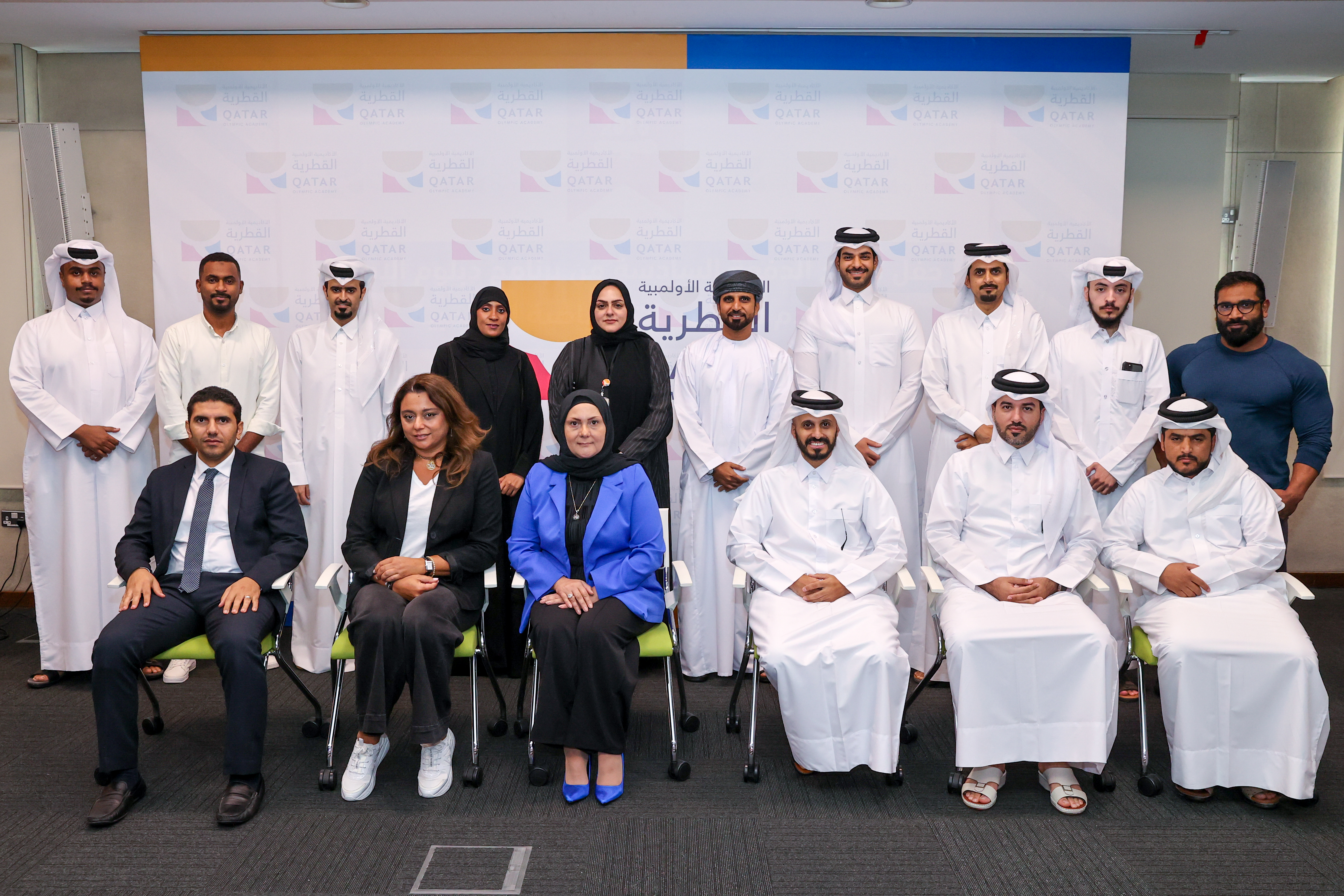Doha:
In collaboration with the Olympic Solidarity of the International Olympic Committee, the academy concluded the course on the Principles of the Olympic Movement in the Sports System "Management 1," which the academy holds as part of a series of sports management programs accredited by the International Olympic Committee on a regular basis throughout the year.
This course is considered the first preparatory stage for the Diploma Program in Sports and Olympic Management, which the academy holds every year. It sees a significant turnout from students interested in administrative work in the sports field, both from within Qatar and abroad. Many sports leaders in the region, particularly in the Gulf Cooperation Council, have graduated from this program.
This course lasted for five days from September 1st to 5th, with the participation of nearly thirty students from both inside and outside Qatar, who belong to various sports, administrative, technical, and specialized fields.
The course was presented by Professor Hisham Al-Adwani, Vice President of the Omani School Sports Federation, Director of the Sports Management Diploma Program at the International Olympic Committee, and an international lecturer in sports management accredited by the International Olympic Committee, who has held numerous administrative positions in the field of Omani sports.
At the beginning of the program, the aggressive speaker discussed the concepts of sports management, which is defined as the art of coordinating the elements of work and the sports product within sports organizations and presenting it in an organized manner to achieve the goals of these organizations. It is also necessary to define the goals in sports management; however, there are other important elements that represent the pillars of any successful sports administrative work.
He then spoke about the founding of the Olympic movement and the modern Olympic Games (Olympic history), noting that the ancient Olympic Games were organized in Olympia, Greece, from the eighth century BC until the fifth century AD. The organization of the modern Summer Olympics, in their current form, began in 1896, initiated by the Frenchman Pierre de Coubertin, the president of the International Olympic Committee and the founder of the modern Olympic movement. In that edition, 241 athletes from 14 countries participated, competing in nine sports and 43 events.
The games experienced a halt during World War I and also during World War II, only to witness development in the 20th century, which manifested in the establishment of the Winter Olympic Games for ice and snow sports, the Paralympic Games, and the Youth Olympic Games.
Social, economic, and global technological changes have influenced the trajectory of the Olympic Games, which were originally exclusive to amateur athletes, transforming them into an event open to professionals. This shift has resulted in increased media interest and expanded marketing through the growing sponsorship of major corporations.
Then he moved on to discuss the Olympic symbols, the Olympic Charter, and Olympic values, noting that the Olympic Charter serves as the constitution for the Olympic movement and the organization of the Olympic Games. It encompasses the rules and regulations established by the International Olympic Committee, and in the event of a dispute or disagreement regarding the interpretation or application of these decisions, it is resolved by the Executive Board of the International Olympic Committee.
In some cases, disputes are resolved through arbitration before the Court of Arbitration for Sport (CAS), which was established in 1993. The court is composed of twenty judges and is considered an independent authority separate from the International Olympic Committee.
On the fourth day, the focus of the lecture was on management skills and the steps to develop administrative and sports personnel, which positively reflect on the achievements made by sports federations, whether in professional sports or in community sports and promoting sports within society.
On the last day, the lecture discussed planning and resource management in sports institutions, and a test was conducted for the students on what they had studied during the five days of the course.
It is worth mentioning that this course is considered the first qualifying part of the Sports Management Diploma program. The academy will also offer the second qualifying course titled "Modern Management for Olympic Sports Institutions" in mid-October. This course will cover several relevant topics, primarily focusing on management skills in the sports field, such as the benefits of good communication and effective interaction, as well as managing the work environment, time management in sports institutions, and the importance of time management. Other key topics will include technical management, event and activity management, as well as human resources management.
More news

Qatar Olympic Academy Celebrates Graduation of Postgraduate Program Participants
Doha – February 17, 2026: Under the patronage of His Excellency Sheikh Joaan bin Hamad Al Thani, President of the Qatar Olympic Committee and Chairman of the Qatar Olympic Academy, the Academy celebrated this morning the graduation of students from its postgraduate programs at the headquarters of the Qatar Olympic Committee.

Qatar Olympic Academy Concludes Course on “Physical Activity and Autism”
Doha – February 2026: The Qatar Olympic Academy has concluded its five-day course on “Physical Activity and Autism”, held from February 1 to 5 at the Academy’s headquarters. The program witnessed wide participation of more than forty male and female trainees from inside and outside Qatar, representing diverse professional and academic fields related to physical education, sports training, special education, and the humanities, in addition to a number of parents of children with Autism Spectrum Disorder (ASD).

Qatari Olympic Academy Signs Memorandum of Understanding with Saudi Olympic Academy
Tashkent - Uzbekistan – January 26, 2026: The 46th Asian Olympic Council meeting in Tashkent, Uzbekistan, witnessed the signing of an important memorandum of understanding between the Qatari Olympic Academy and the Saudi Olympic Academy, in a step that enhances regional and Gulf sports cooperation. The agreement, signed by the Qatari Olympic Academy with the Saudi Olympic Academy, aims to strengthen cooperation in the field of developing sports training cadres.

